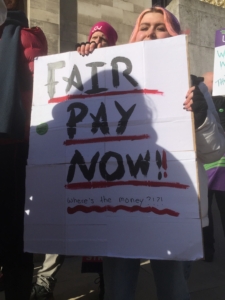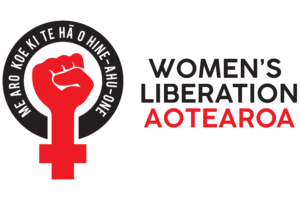Women stand up!
By: Karolyn
11 May 2025
Government guts pay equity agreements, then tells women it’s for their own good
Many women I know are livid that the NZ coalition government’s Pay Equity Amendment Bill was passed this week by Parliament.[i] This has brought pay equity negotiations, as previously laid out in the Equal Pay Act, to a grinding halt. The outcome is the cancellation of 33 claims being currently negotiated, along with several tighter restrictions making it much harder to make such claims in future.
The PSA and some other unions [ii] are protesting about the cancellation of the crucial pay equity claims that they are in the middle of negotiating.
Low paid, precarious hospitality work
In 2023 I wrote about Brooke van Velden’s plan to change Fair Pay agreement processes, [iii] thereby eroding the gains in financially supporting the economic and social value of the work done by large numbers of women. My post focused on the impact of repealing the Fair Pay Act on the plight of low paid female hospitality workers that too often have precarious employment, little hope of career progression, often work part time, and not many are in unions.
While the government has invested funding in expanding tourism,[iv] to the benefit of the wealthy owners and shareholders of businesses, they will be reaping profits off the exploited labour of a lot of low paid women, struggling to survive in difficult times.
Care and support work – the historical legacy
Care and support work, largely done by women, is particularly in need of more equitable pay. The improved deals the Public Service Association (PSA) have been negotiating [v] will now be cancelled.
Within the dual interacting systems of capitalism and patriarchy, this sort of work has been traditionally done by women resulting in the legacy of female-dominated occupations that are undervalued and underpaid. This dates from a time when men were seen as the household breadwinners, and women’s role was relegated to that of unpaid domestic support workers, carers, and reproducers of the largely male workforce. It does not matter whether 60% or 70% of such work is now done by women, the legacy of the underpayment and undervaluing of such work remains in significant underpayment.[vi]
Care and support work has continued to rely heavily on the exploitation of women’s unpaid, and (low paid) labour, largely to the benefit of a high proportion of males, especially those in the middle- and upper-income levels and positions of power. Often ignored is the fact that in this system, women in low-income household always had to do additional paid labour on top of their household duties, to supplement the family income.
Well remunerated care work benefits everyone
For too long a very high proportion of low paid women have been expected to provide the undervalued support work which benefits society, while enabling large numbers of men to participate in the higher paid workforce and children to be born and prepared for their place in the paid work force.
A 2022 UN Toolkit on paid and unpaid work,[vii] stated that,
“Care should be recognized as both a universal right and an essential building block for economic and social wellbeing and sustainable development.”
It also noted that it is crucial to recognise the value of care work and that it is important to ensure, “the resilience of care systems” in the light of the global challenges of such on-going issues as “climate change, conflict and the Covid-19 pandemic…”
The complex skills of women’s work
It was, and still is believed by some, that women are natural carers and supporters of others because of our biological capability to carry, give birth to and nurture babies. However, caring skills are not equally evident in all women. Much of this is learned behaviour passed down through successive generations as there is an interaction between our sexed biology and the social expectations and socialisation from an early age.
I have trained childcare workers and observed the differences among women in their childcare capabilities. Too many people underestimate the complex skills required for such work [viii] and it is not easy to make highly specific comparisons with male-dominated occupations as the Pay Equity Amendment requires.
Women need to stand together
Brooke van Velden, in a blatant display of callous internalised misogyny, along with the rest of the government coalition MPs and their parties, show contempt for women and disregard for the economic and social benefits of care work.
Women in middle- and high-income households (including right wing female MPs) are shielded from the direct impacts of the institutionalised disregard for the caring and support work of large numbers of women, along with the smaller number of low paid male workers also employed in these occupations.
Well-paid women can afford child, youth, invalid, disability and elder care, for their families, plus enjoy the benefits of hospitality and tourism carried out on the backs of the low paid exploited, female-dominated work force. Meanwhile, some women with comfortable lifestyles seem able to callously betray those women who are most damaged by patriarchal capitalism.
Hasty, undemocratic Bill
The hasty passage of the Pay Equity Amendment Bill [ix] through the House this week
also shows contempt for the democratic process. The system for negotiating pay equity was carefully negotiated in consultation with unions over a significant period with the resulting Bill going through the full Parliamentary process. [x]
Amending it is being done without going through such a necessarily rigorous process. There’s been no Regulatory Impact Statement and no thorough investigation of how it impacts on BORA. [xi]
Who benefits? it’s not women, low paid workers or the country
Meanwhile, the coalition government has given spurious reasons why previous, ground-breaking pay equity legislation has been strongly undermined. ACT leader David Seymour’s statements inadvertently indicate that it is more about saving billions in the government budget: in practice, their budgets provide significant benefits for powerful corporations, their beneficiaries, and the likes of landlords, while denying low paid workers in female-dominated occupations a fair remuneration that adequately values their contribution to the good of the country. Coalition party leaders, in a breath-taking Orwellian move, are claiming that amending the law, and doing it without due process, will somehow benefit women. [xii]
Many of us are not that gullible and are protesting, and also signing a petition to the House of Representatives against the amendments to the Equal Pay Act and for pay equity. [xiii]
It says,
“To: The House of Representatives
We the undersigned call on you to:
-
- Reverse all claim cancellations by restoring existing pay equity claims – including for care and support workers, teachers, and library assistants.
- Undo Equal Pay Act changes that make it impossible for people working in female-dominated professions to achieve and keep pay equity.
- Deliver pay equity settlements to every worker waiting for their claim.”
- Reverse all claim cancellations by restoring existing pay equity claims – including for care and support workers, teachers, and library assistants.

UCU_and_Unison_strike_placard_
(fair_pay_now)
1 March 2022, 11:09:15
by Alarichall; Wikimedia Commons
References:
[i] RNZ, “Pay Equity Amendment Bill passes under urgency”, 8 May, 2025. https://www.rnz.co.nz/news/political/560257/pay-equity-amendment-bill-passes-under-urgency
[ii] Press Release PSA, Scoop Politics, 6 May 2025. https://www.scoop.co.nz/stories/PO2505/S00033/dark-day-for-women-as-government-slams-brakes-on-pay-equity-to-save-money.htm E ū, a union for private sector workers, is one of the unions protesting the Pay Equity Amendment Bill: McIlraith, Brianna, Stuff Business, “Unions launch petition to protect pay equity”, 7 May 2025. https://www.stuff.co.nz/business/360680867/unions-launch-petition-protect-pay-equity
[iii] Karolyn, “Fair Pay for Exploited Women, WLA website, 4 December
[iv] NZ Herald, “Tourism NZ gets $13.5m to attract more visitors – China, Australia, US key targets”, 4 April 2025. https://www.nzherald.co.nz/nz/politics/christopher-luxon-faces-media-amid-questions-over-winston-peters-trade-comments/V2U52SDIBVFPRDHTZUEVO6LHTI/
[v] Press Release PSA, Scoop Politics, 6 May 2025. https://www.scoop.co.nz/stories/PO2505/S00033/dark-day-for-women-as-government-slams-brakes-on-pay-equity-to-save-money.htm
[vi] Ling, Jenny, Northern Advocate, 7 May 2025. “Northland leaders blast Government’s pay equity reforms” https://www.nzherald.co.nz/northern-advocate/news/northland-leaders-slam-governments-pay-equity-reforms/LWNUJ4JZDZEZPKDUCYC37DMV2Q/
[vii] UN Women, “A Tool Kit for Paid and Unpaid Care Work: From 3Rs to 5Rs”, June 2022. https://www.unwomen.org/sites/default/files/2022-06/A-toolkit-on-paid-and-unpaid-care-work-en.pdf
[viii] Ireland, Emily, Stuff NZ News, “Councillor challenges Govt to call snap election over pay equity changes”, 8 May 2025. https://www.stuff.co.nz/nz-news/360682135/councillor-challenges-govt-call-snap-election-over-pay-equity-changes
[ix] 1News Reporters, 1News, “Pay Equity Bill Passes Under Urgency”, 8 May 2025. https://www.1news.co.nz/2025/05/08/pay-equity-amendment-bill-passes-under-urgency/
[x] RNZ, “Fair Pay Agreements Bill passes third reading in Parliament”, 26 October 2022. https://www.rnz.co.nz/news/political/477448/fair-pay-agreements-bill-passes-third-reading-in-parliament
[xi] Moir, Jo, RNZ, “National briefed its MPs two days prior to pay equity overhaul announcement”, 8 May 2025. https://www.rnz.co.nz/news/political/560368/national-briefed-its-mps-two-days-prior-to-pay-equity-overhaul-announcement
[xii] Moir, Jo, RNZ, “Pay equity legislation could save ‘billions’ for government – PM”, 6 May 2025. https://www.rnz.co.nz/news/political/560101/pay-equity-legislation-could-save-billions-for-government-pm
[xiii] NZCTU, Together, “Protect Pay Equity – stop scrapping equal pay claims and law”, May 2025. https://www.together.org.nz/fbt_for_pay_equity


Leave a Reply
Want to join the discussion?Feel free to contribute!